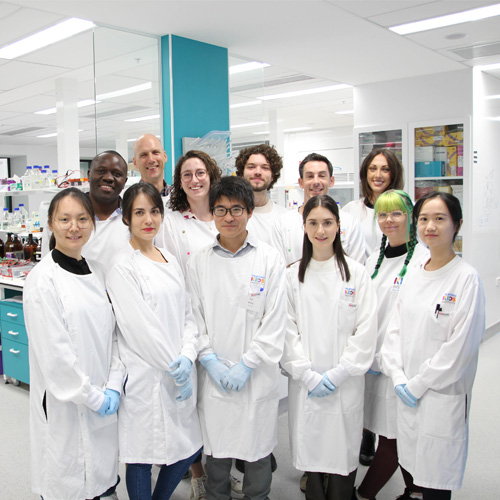Search
Research
PPARalpha and PPARgamma activation is associated with pleural mesothelioma invasion but therapeutic inhibition is ineffectiveMesothelioma is a cancer that typically originates in the pleura of the lungs. It rapidly invades the surrounding tissues, causing pain and shortness of breath. We compared cell lines injected either subcutaneously or intrapleurally and found that only the latter resulted in invasive and rapid growth.
Research
Tumor Infiltrating Effector Memory Antigen-Specific CD8(+) T Cells Predict Response to Immune Checkpoint TherapyImmune checkpoint therapy (ICT) results in durable responses in individuals with some cancers, but not all patients respond to treatment. ICT improves CD8+ cytotoxic T lymphocyte (CTL) function, but changes in tumor antigen-specific CTLs post-ICT that correlate with successful responses have not been well characterized. Here, we studied murine tumor models with dichotomous responses to ICT.
Research
Fuzzy model for quantitative assessment of the epidemic risk of African Swine Fever within AustraliaAfrican Swine Fever (ASF) has spread rapidly across different continents since 2007 and caused huge biosecurity threats and economic losses. Establishing an effective risk assessment model is of great importance for ASF prevention, especially for those ASF-free countries such as Australia.

We think all kids with Sarcoma should be able to lead happy, healthy lives! To achieve this, we aim to discover and develop safer and more effective treatments by doing inventive and rigorous research. We focus on addressing high relapse rates using a combination of unique pre-clinical models, patient samples and systems immunology.

Research
Cancer CentreListed are all The Kids Research Institute Australia research teams involved in our Cancer Centre. This Centre sits under the Chronic and Severe Diseases research theme.
Research
Time-course RNAseq data of murine AB1 mesothelioma and Renca renal cancer following immune checkpoint therapyTime-critical transcriptional events in the immune microenvironment are important for response to immune checkpoint blockade (ICB), yet these events are difficult to characterise and remain incompletely understood. Here, we present whole tumor RNA sequencing data in the context of treatment with ICB in murine models of AB1 mesothelioma and Renca renal cell cancer.

News & Events
Premier’s Science Awards finalists recognised for work in physical activity, cancer and mental healthFour The Kids Research Institute Australia researchers from a diverse range of fields have been named as finalists for the prestigious 2022 Premier’s Science Awards.
Research
Role of COL5A1 in lung squamous cell Carcinoma: Prognostic Implications and therapeutic potentialLung squamous cell carcinoma (LUSC) is a significant health concern, characterized by a lack of specific therapies and limited treatment options for patients in advanced stages. This study aims to identify key molecules of prognostic importance in LUSC and provide an experimental foundation for their potential therapeutic applications.
Research
Malignant Pleural Effusions—A Window Into Local Anti-Tumor T Cell Immunity?The success of immunotherapy that targets inhibitory T cell receptors for the treatment of multiple cancers has seen the anti-tumor immune response re-emerge as a promising biomarker of response to therapy. Longitudinal characterization of T cells in the tumor microenvironment (TME) helps us understand how to promote effective anti-tumor immunity. However, serial analyses at the tumor site are rarely feasible in clinical practice.
Research
Financial toxicity of informal caregivers of colorectal cancer patients: A cross-sectional studyTo assess the level of financial toxicity of informal caregivers of colorectal cancer patients and explore the related key influencing factors.
